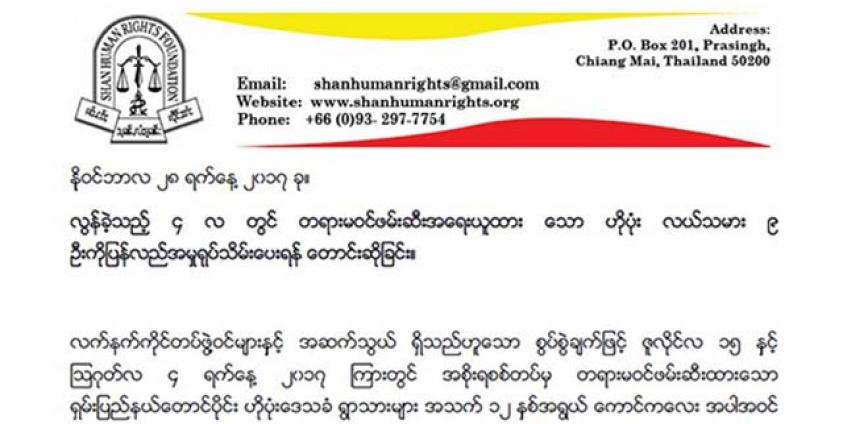The Shan Human Rights Foundation (SHRF) is demanding the Tatmadaw release nine residents of Hopong township, including a 12-year-old boy, all of whom it claims were wrongfully arrested and are being unfairly persecuted.
The residents were rounded up in July under the pretense that they harbored suspicious ties with the Restoration Council of Shan State/Shan State Army-South (RCSS/SSA), according to a statement from the rights group. Despite the fact that the RCSS is a ceasefire signatory, and so is no longer deemed an illegal organization, the nine residents are facing multiple charges at Hopong Court.
“The government shouldn’t delay examining their cases. We want their charges to be dropped immediately,” said Sai Hor Hseng, a spokesperson of the SHRF.
Although the 12-year-old child was released, he continues to be called for hearings in a trial that is interrupting his education, Sai Hor Hseng added.
Sai Kham, a relative of one of the detained residents, said over 10 hearings have been called, but a chronically absent plaintiff has repeatedly delayed the court process. He added that the families are having trouble travelling back and forth from Nam Hkoke Village to Hopong.
The SHRF said prolonged suffering is being inflicted on both the detained farmers and their families and called for the government to intervene to ensure an unconditional release.
“The families need assistance,” said Sai Hor Hseng.
He added that the government should consider how the case will reflect on the validity of the nationwide ceasefire agreement, the hallmark peace deal which it is trying to convince all ethnic armed groups to sign before engaging in political dialogues.
“If the government continues to commit such unfair acts and human rights violations, it won’t be seen as supporting peace and it make other ethnic armed organizations hesitate in signing the NCA,” he said.
Sao Myawaddy, the defense lawyer for all nine, said the Tatmadaw has charged them for alleged possession of weapons as well as for trespassing on a military operations area. They face additional charges under the import and export law, and the telecommunication law.







